Gay-themed art house films dominate the movie landscape in Dallas this week: ‘Gun Hill Road,’ ‘Toast,’ ‘Weekend’
ARNOLD WAYNE JONES | Life+Style Editor
jones@dallasvoice.com
It somehow seems appropriate that in the middle of October — Gay History Month — a trio of gay art films arrive simultaneously on movie screens in North Texas…. And there’s not even a film festival in town. From a youthful coming-out comedy-drama to an intense story of a trans kid in the barrio to oversexed gay men in Britain, the slate shows a panorama of gay experiences — all compelling in their way.

BOYS FITTING IN | A trans Latino teen (Harmony Santana, above left) worries about coming out to her violent dad (Esai Morales) in ‘Gun Hill Road
Gun Hill Road
Enrique (Esai Morales) has just been released from a three-year stretch in prison, planning to reconnect with his wife Angela (Judy Reyes) and teenaged son Michael (Harmony Santana). But much has changed since he was sent up. Angela has been emotionally if not physically unfaithful, taking comfort with a neighbor much more stable and affectionate than Enrique. Michael is terrified that his macho Puerto Rican father will discover that on the side, he identifies as trans; as Vanessa, he even performs in the local drag show.
Gun Hill Road is the kind of movie that, even as you are watching it, you cannot help but think, “How did this film get made?” I mean that in the best sense. With a cast of well known if not exactly bankable stars, it has some mojo behind it. But trans teens in Hispanic culture? This doesn’t exactly scream “box office bonanza.”
Which is part of what makes it so daring. Most coming out movies are distinct for being (a) silly comedies that are (b) about middle-class white folk. A drama set among Latinos, and one dealing not just with cross-dressing but a transgender teen protagonist? Well, such things are rarer than a cogent sentence out of Sarah Palin’s mouth. The scenes where Vanessa recklessly explores transitioning with untested drugs and procedures will make you squirm; it’s like pre-Roe v. Wade abortion 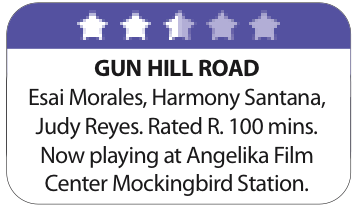 movies, where people forced into shame become so desperate they put themselves in danger.
movies, where people forced into shame become so desperate they put themselves in danger.
So much of Gun Hill Road is on the fringe, it is slightly disappointing that the story ultimately follows a well-worn path of discovery, recrimination, reconciliation. Last year’s La Mission with Benjamin Bratt trod similar ground, and was equally lacking in humor. La Mission was also more brightly lit and briskly paced.
Still, despite a few shortcomings, Gun Hill Road delivers a lot of what it promises, thanks to sincere performances by the three principals in telling a story with insight and understanding.

In ‘Toast,’ a British lad (Freddie Highmore, above far right) takes solace from his miserable home life in the kitchen on his way to fame as a chef.
Toast
There’s an unmistakable connection between love, sex and food in the mind of young Nigel Slater (Oscar Kennedy). His mother is not the best cook — indeed, she seems to barely understand the concept at all. She has never purchased fresh produce (“You don’t know where it’s been!” she clucks) and cooks canned goods by dropping the sealed cans in a pot of boiling water. Nothing ever turns out as anything close to edible, though Nigel’s dad (Ken Stott) doesn’t seem to notice. Most meals end with mom slathering some butter on toast and calling the effort a success. (“It’s impossible not to love someone who makes toast for you,” Nigel observes, though I’m not quite sure I see the connection.)
It’s become almost clichéd that great chefs grew up with mothers’ who couldn’t boil water; former Gourmet magazine editor Ruth Reichl documented her own mom’s incompetence in memoirs like Tender at the Bone. So it is no surprise that Nigel would grow up to be one of Britain’s most respected food writers and TV cooking show hosts.
But Toast — the film adaptation of Slater’s memoir of growing up in 1960s England with a distant father, a loving but unadventurous mother and, eventually, a blowsy stepmom who happens to be an expert cook — is more than a whimsical comedy about a kid’s love of food. Indeed, aside from the overriding tone, it’s not much of a comedy at all. There’s death, parent-child abuse, homophobia and assorted feelings of anguish heaped on young Nigel, who even at age 9 is beginning to realize he’s attracted to other boys and feels just as lost in those feelings as he is in his love for duck a l’orange.
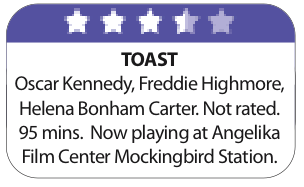 Some of the comic tension comes about halfway through in the form of Helena Bonham Carter as Nigel’s lower-class stepmother, a cleaning lady who woos his dad with her unrivaled lemon meringue pie. As the two jockey for the dad’s affection, the kitchen becomes a sort of battleground of wills.
Some of the comic tension comes about halfway through in the form of Helena Bonham Carter as Nigel’s lower-class stepmother, a cleaning lady who woos his dad with her unrivaled lemon meringue pie. As the two jockey for the dad’s affection, the kitchen becomes a sort of battleground of wills.
Kennedy plays Nigel in the first half with guileless charm; Freddie Highmore (Finding Neverland, Charlie and the Chocolate Factory) takes over as the teenaged Nigel, showing tenderness as he gets his first kiss from a puppy love crush. It’s portrayed as something as delicate and sweet as a caramel tuile — a fitting metaphor for a film that gorges you on its beauty and fondness for food. That’s something to raise a toast to.
Weekend
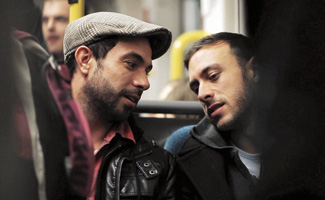
YOU GOT THE HOOK UP | A one-night-stand becomes something more for Russell (Tom Cullen, left) and Glen (Chris New) in the raw English drama ‘Weekend.’
You get a very different view of Britain and the gay experience with Weekend, an edgy, almost shapeless gay romance that crackles with familiarity even as it paints a detailed, specific portrait of average men trying to connect.
Russell (Tom Cullen) is a crack-smoking, working class English bloke hangin’ and drinkin’ with his straight mates before hitting a gay bar for some quick action. He meets Glen (Chris New), an otter whom he assumes will be a one-night stand before heading off to work on Saturday morning. But Glen wants to turn the hook-up into an art project, asking Russell to record his experience. When Glen’s probing questions make Russell uncomfortable (“Are you completely out? Do you wish my dick was bigger?”), Russell’s bourgeois sensibilities emerge.
Writer-director Andrew Haigh has captured an authenticity of the modern gay experience with an off-handed, sharply observed eye. He shows an extended segment of Russell toying with texting Glen to apologize, feeling pangs of guilt but also curiosity and self-reflection — a process that will strike a note of familiarity with anyone on the dating scene today.
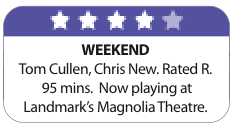 Weekend conjures moments of early Gus Van Sant, like My Own Private Idaho and Drugstore Cowboy: It’s full of textures and naturalistic moments that feel unforced. Haigh is a master of long takes that are voyeuristic without seeming prurient. When Glen and Russell meet up again, their banter is both meaningless and confessional, which creates a palpable tension. Their body language points to hormones racing, but they are determined not to make this relationship only about sex, even though the sexual energy is undeniable. This makes the scenes romantic and erotic, and when they explode with passion, you don’t feel like the director has inserted a de rigueur sex scene, but encapsulated the dynamics of the hookup-turned-real-relationship dance (including the slightly scary obsessiveness of “Is this the one?” angst).
Weekend conjures moments of early Gus Van Sant, like My Own Private Idaho and Drugstore Cowboy: It’s full of textures and naturalistic moments that feel unforced. Haigh is a master of long takes that are voyeuristic without seeming prurient. When Glen and Russell meet up again, their banter is both meaningless and confessional, which creates a palpable tension. Their body language points to hormones racing, but they are determined not to make this relationship only about sex, even though the sexual energy is undeniable. This makes the scenes romantic and erotic, and when they explode with passion, you don’t feel like the director has inserted a de rigueur sex scene, but encapsulated the dynamics of the hookup-turned-real-relationship dance (including the slightly scary obsessiveness of “Is this the one?” angst).
Cullen and New have great chemistry and an easy way with the rambling dialogue, but this is Haigh’s movie. Because it’s fairly raw (there’s lots of casual frontal nudity), it’s not the kind of film likely to be a crossover hit with straight audiences, but neither does it ooze “gay-ghetto movie,” the kind that assumes a small, lemming-like audience who can get titillated and forget about it. Like the Irish romance Once, it rings truth out of every frame.
……………………..
• online exclusive
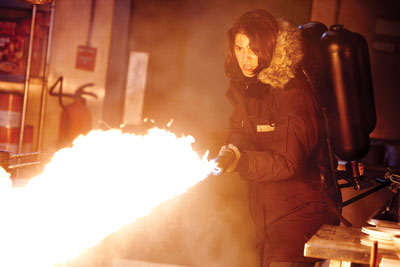 For more reviews of more films opening this weekend, including The Thing, pictured, and Incendiary, visit DallasVoice.com/ category/Screen.
For more reviews of more films opening this weekend, including The Thing, pictured, and Incendiary, visit DallasVoice.com/ category/Screen.
This article appeared in the Dallas Voice print edition October 14, 2011.














where do we go to watch these movies or where can we purchase them?